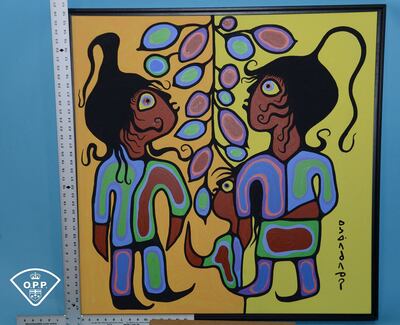Canadian police said they have dismantled a decades-old forgery ring accused of producing and selling thousands of fake paintings by indigenous artist Norval Morrisseau around the world.
Eight people, including a nephew of Morrisseau, were arrested this week and face a total of 40 charges including forgery of artworks and of paperwork that purported to authenticate them.
"Over 1,000 allegedly fraudulent paintings have been seized. The total number produced and sold is unknown," Ontario Provincial Police Deputy Commissioner Kari Dart told a news conference on Friday.
Some of the paintings sold for tens of thousands of dollars to unsuspecting buyers across Canada and internationally.
Detective Kevin Veilleux said the forgery ring began in 1996 with a single individual, David Voss, 51, allegedly making counterfeit paintings himself "before growing his organisation into a full assembly line of painters".

In 2002, Morrisseau's nephew Benjamin, now 53, joined the group as one of two indigenous painters enlisted to help mass produce the fakes.
Norval Morrisseau, also known as Copper Thunderbird and widely regarded as the grandfather of Canadian indigenous art, established a pictographic style of contemporary indigenous art, referred to as the Woodland School.
Self-taught, in 1962 he become the first indigenous artist to have his artworks shown in a contemporary Canadian art gallery, sparking growing interest in his work. Most indigenous art until then had been viewed with an anthropological lens rather than as modern art.
Morrisseau's artworks are now found in galleries across Canada and around the world. Originally from the Bingwi Neyaashi Anishinaabek First Nation (formerly called Sand Point First Nation), he died in 2007 aged 75.
"He was the first contemporary indigenous artist to break into the mainstream art world in Canada," said Dart, who called his contributions to art and culture "significant and incomparable".
It is those contributions and his global success that may have made him an "easy target for fraud", she concluded.
